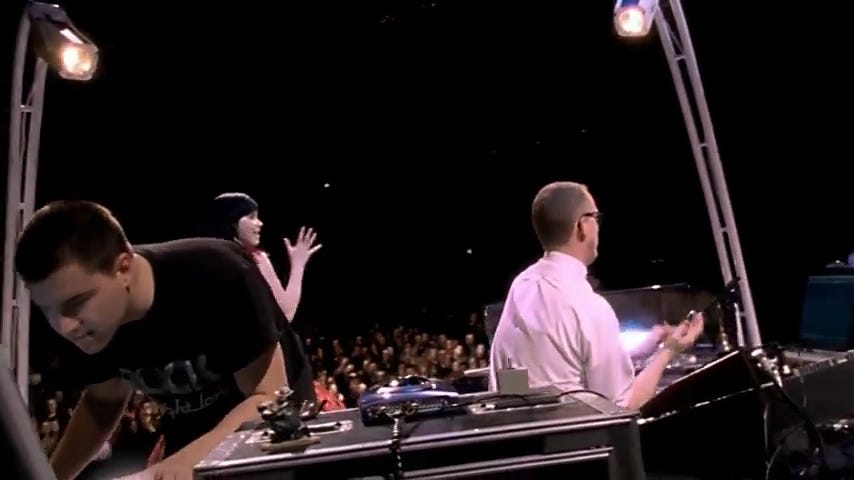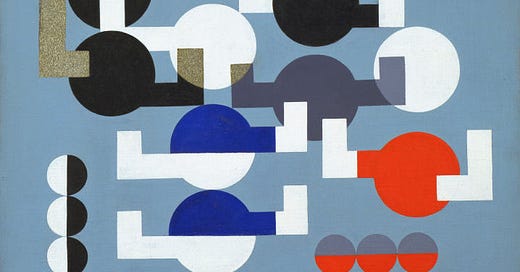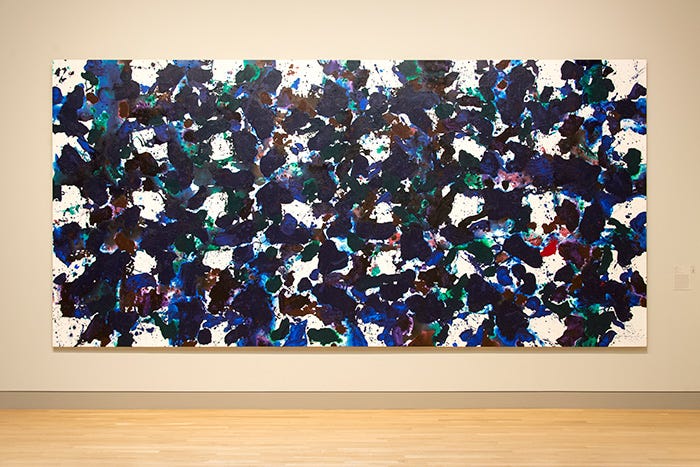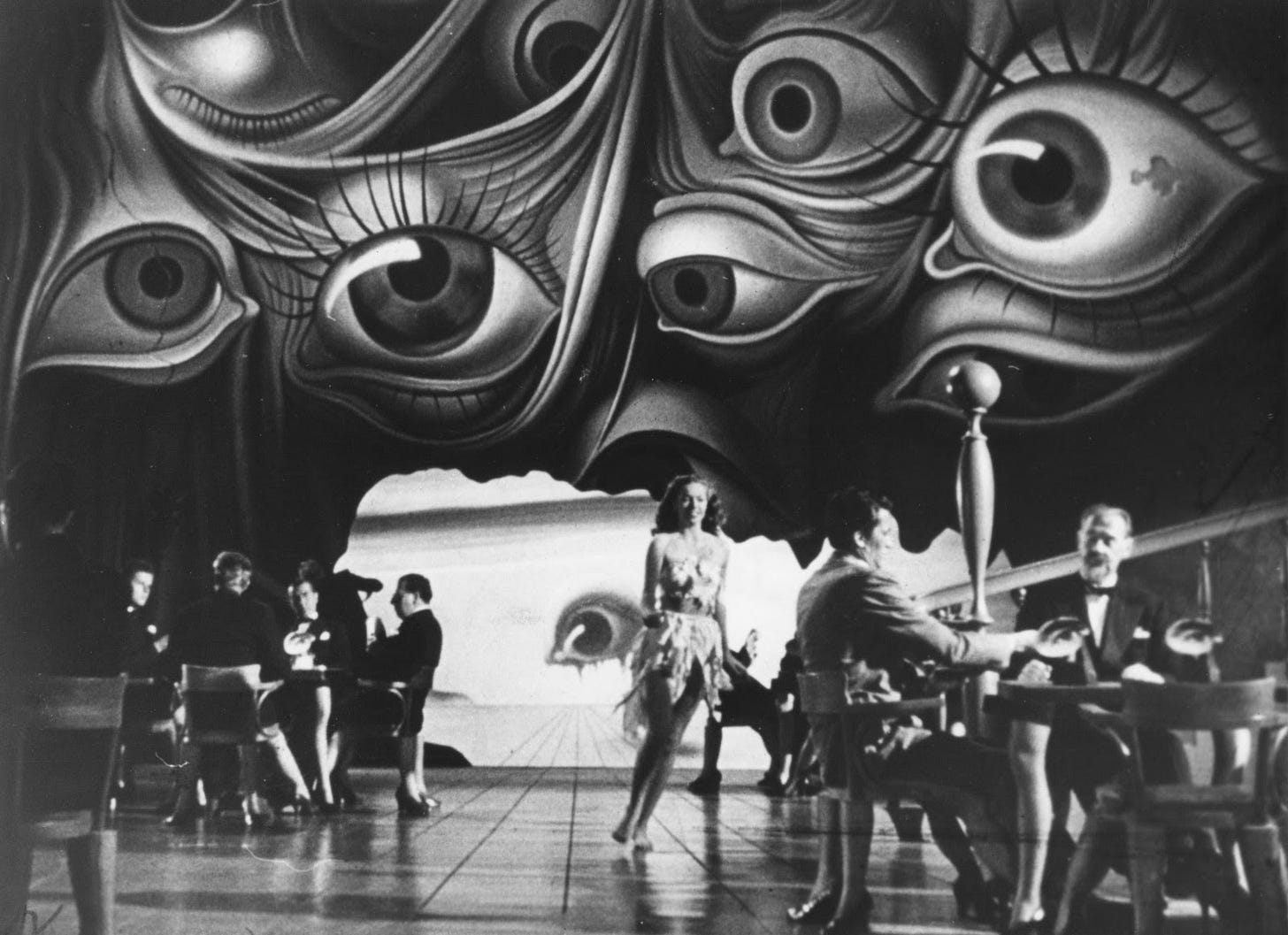It’s Always a Good Year for IDM
Drew Daniel of Matmos and RamonPang reflect on 30 years of IDM.
(Foreward by Jozef White)
One of the toughest questions I get about Tabula Rasa is: “What kind of music do you release?” Because the honest answer is basically impossible to say with a straight face. Music that sits between categories, pushes into new territory, and occasionally turns the club upside-down sounds about right, but we cover a lot of ground. From ambient to experimental and from dance-adjacent to club ready. However, if there’s one through-line, one sort of aesthetic adhesive holding it all together, it’s probably IDM.
IDM has always been a genre and an anti-genre, both a meme and a movement: a refuge for headphone hermits and gear freaks who you may not always see at the club, but will definitely find posting their modular rigs, listening rooms, and convoluted synth patches on forums.
In this week's piece, RamonPang talks with our friend, and legendary musician, Drew Daniel of Matmos and The Soft Pink Truth, about the strange persistence of this horrible term, the mythology around artists that have come to define it, like Aphex Twin and Autechre, and what it means to love music that often wants nothing to do with you.
First coined in the early ’90s, “Intelligent Dance Music” was always a misnomer. Equal parts pretentious and provisional. It gathered around Warp Records ‘Artificial Intelligence’ series and clustered artists like Aphex Twin, Autechre, and μ-Ziq into something that sounded less like a genre and more like a shared allergy to convention.
Since then IDM has never really died. It slowly but steadily seeped out into the club, into culture, into the charting deluge of modern pop. Since SOPHIE twisted hyper-gloss into high art and Playboi Carti started topping charts with tracks with absurd, maximalist production, that sound like they were mixed on a GameBoy Advance in the trunk of a 1990s Toyota, many of those aesthetics that IDM once tried to gatekeep are now everywhere. Aphex Twin originals, straight off Selected Ambient Works and Drukqs, are scoring every other TikTok, IG Reel, and any half sentimental shitpost with a nostalgic caption.
So, perhaps the better question isn’t “what is IDM?” It’s: what work is IDM doing in 2025, now that it's simultaneously everywhere and nowhere?
Enjoy as Ramon and Drew explore these questions in much more depth below.
Also, we’ve put together an IDM playlist with a selection of some tracks that have come to define the genre, a few of our personal favorites, including a few from Drew’s projects, and from the artists mentioned in this piece. Click here to listen.
The Irony of Intelligence
(RamonPang)
A few weeks ago, I was in the online Bandcamp listening party for Djrum’s newest album, Under Tangled Silence. Between that and the new Barker record, I caught myself thinking: “Damn, 2025 is a good year for IDM already.” Then I remembered I had the exact same thought in 2024, while listening to the new Iglooghost album—not long after the latest from Skee Mask dropped.
Which got me wondering… maybe it’s not just 2025. Maybe it’s always a good year for IDM. What does IDM even mean in the 2020s?
IDM—Intelligent Dance Music, if you're feeling brave enough to use its full government name—has always been kind of a cursed term. Hated by many of the artists it supposedly describes (as famously parroted by Wikipedia), yet somehow still the easiest shorthand we have for a constellation of sounds and sensibilities: a rotating cast of others who keep the breakbeats skittering and the synth patches slippery.
The irony, of course, is that IDM remains a hilariously perfect post-genre label. It’s opaque, inaccessible, and still raises eyebrows among exactly the people most likely to be obsessed with it. And in the 2020s, part of why it endures might be because it’s both meme-proof and meme-fueled at the same time. Each artist has their own little solar system of fans—dedicated, often hilariously self-aware, and occasionally spiraling into the same obsessive devotion you see in Tool fandom. Aphex Twin’s prankster energy is now part of pop culture. Autechre’s listeners joke they love the records even if they have no clue what’s happening. Oneohtrix Point Never’s fans meme about screaming into bongs while absorbing his latest album. Burial meme pages exist solely to worship his most inaccessible tracks.
The fans and musicians know they’re weird. And when you catch yourself in the weirdness, you either step back—or you double down. You lean harder into the progressiveness of the music, and deeper into your relationship with your chosen artist and their orbit. I say this as someone who once made a track that sounded like dying dial-up modems layered with harp, and somehow won a Baauer beat battle with it during lockdown.
The most positive part of this? The baggage of whether “IDM” actually makes you intelligent, or superior to others, seems to be a laughable relic of the past.
In this conversation with Drew Daniel of The Soft Pink Truth and Matmos—a duo who’ve spent decades gleefully crossing genre boundaries while still being canonized inside them—I wanted to get into IDM’s awkward adolescence, the behavior of its fans, its flirtations with pop and dance culture, and the persistent mindset that keeps its forward-pushing legacy relevant.
Drew Daniel, in conversation with RamonPang
[This conversation has been edited for length and clarity.]
Drew Daniel: I don't know who's to blame for coming up with [the phrase] “intelligent dance music”. I would feel like the Artificial Intelligence Warp compilations were the core of attaching the word "intelligence" to a set of music that had one foot in techno and electro, one foot in ambient.
I don't think anybody had like a... a racist agenda or a racist plan. I don't think anybody meant for the name to wind up having the kind of weird connotations that, for me, led to me feeling very negatively toward the phrase “intelligent dance music”.
To take something like dance music and then say, "Well, I've done that, but I've done an intelligent version of it," is to say the people that made dance music were stupid. It's to imply, like, "I am superior, and what makes me superior is my intelligence."
And if intelligence is expressed through maybe the complexity of a pattern or the time signature or some textural flourishes, it's basically saying: "An idiot made something very basic--which was electro or house or techno--but I, the smart person, am going to do that and add all this extra shit that wasn't there before, because I'm so smart."
And it's flattering to the artist, and it's flattering to the listener, because then it tells them: you, by enjoying this record, are more intelligent than those idiotic people over there.
RamonPang: [sarcastically] Yeah, the ones who dance in clubs and stuff like that. Or go to raves, you know?
Drew Daniel: It's like a very rigged, circular, self-flattering, pompous attitude. I don't know if they were arguing about this online. You'd have to look at the history of the board and see who brought this up. I'm sure people did. I can't imagine they wouldn't.
But it seems like it only became more and more obvious by the late '90s and early 2000s. That this term is actually really shitty. It's politically shitty. It creates a genre that's parasitic on other people's talent and achievement, but implies that it's somehow superseding them. Like it's some kind of arms race: "I built the missile that goes farther than your missile." You know? This kind of arms race about programming.
And I was a part of this era. In terms of--I made records that were IDM. I got put on bills with artists that were IDM. We were always part of that story. And so I benefited from it. I can't act like, "Oh, I always hated it. I was never a part of it. I disavow it." I think that would be very hypocritical and phony--if I acted like IDM wasn't good for me. It was. And I like a lot of that music. And I still do.
I think now people just don't have this dumb baggage about "I'm smarter." You know, the “if I listen to Autechre, I'm smarter than someone who listens to Todd Terry or Masters at Work”. It doesn't actually reflect your intelligence.
I mean, I know neurosurgeons who only listen to house music and hate IDM. And then I'm sure there are people who love IDM that are... kind of dumb, frankly.
RamonPang: Oh my god, me!
That does make sense--the Todd Terry / Masters at Work example. Because to me, in my generation, that's like the roots of house music as we know it. And that deserves to be respected. If you're someone who's my age--I'm 29 years old--and you sing praises about Masters at Work, and you're a tech house DJ, for example, people are gonna look at you like you're a scholar. Like, "This kid knows his shit”.
Drew Daniel: Your mix of the Autechre 4x4 tracks was very fun, I thought.
RamonPang: Oh, thank you!
Drew Daniel: Like, finding that through-line and proving that actually [Autechre aren’t] so allergic to that--sometimes they do it, and when they do, they do it quite well.
I feel like the value of [the term “IDM”] is descriptive. Say I run a record store--where am I putting the records? If you just have something called "electronic music," then that has value because then everything is about the tools--but it doesn't help you with: what does it sound like?
IDM was a catchphrase for things in that triangle between electro, techno, and ambient music. And there was a lot of backward-looking engagement with German cosmic synth music in some of the more ambient edges of the scene. And then, you know, a real worship of Detroit--of Detroit techno and electro. Cybotron - "Clear" and, you know, the classics of electro.
I mean, I think the stereotype of what an IDM record was--at least in the mid-'90s to me--was a few melodic loops and then tons of attention paid to what the kick and the snare are doing, and what the pattern is. So it's like the DNA of something like "Planet Rock" got mutated and now it's doing something that's like "Planet Rock" but isn't. You know? Like, so much of it to me built out from Kraftwerk's "Trans-Europe Express" and its influence on Soul Sonic Force and on hip hop and electro. And then that, as translated by Autechre and people from Sheffield, into a sort of oddly abstracted version of electro.
And then Autechre's example became something everybody else was sort of slavishly trying to imitate. You know? And there were people who were very good at imitating Autechre--to a point. But I think what happened to the scene was a kind of surplus of diminishing returns: people basically trying to remake the Tri Repetae album or the Chiastic Slide album over and over and over.
The other change would be--as music software changed, the kinds of things that people wanted to do changed. The explosion of drum and bass--first jungle, then drum and bass--led to Squarepusher. And then people trying to find, like, "Well, what's the edge of what we can do with drum and bass as a template?"
And then it goes forward into dubstep, and the birth of dubstep, and all the sort of post-dubsteps that are around now. And I think litigating that--of like "What happened to IDM? Did it die? Is it in the DNA of all these new forms of music?"--maybe you're a better person than me to figure that out.
Because you are younger--and to you, you might hear things in dubstep that I don't. Or hear Skrillex and complextro as like, "Oh, well, it's some of the IDM DNA, but pivoted back toward poppy vocals, chirpy vocals, big riffs--a more accessible frame in terms of the length of songs, the stimulus ramp of the drop…”--like, coming to bear on what is essentially some of the same ideas.
RamonPang: I was having this thought recently. There were so many people that tried to copy ambient techno, Aphex, Autechre... or they tried to copy drill and bass and stuff. Or to some extent, they even tried to copy the electro, hip-hop, LA beat stuff from the 2000s.
Drew Daniel: You know, for me, the foundational importance of that electro moment is just because of my age. Right? When I was a 13-year-old, I was going to see movies about breakdancing, and I was listening to Run DMC, and I was trying to pop and lock. And so, for a certain generation, breakdancing was mass culture. It wasn't an underground thing--it was at the mall. Like, everybody--even in the Midwest and the South--wanted to be able to do this. So the idea of electro being part of your DNA was just a generationally shared thing for a set of producers.

But electro can take many forms. I guess what happened in the 2000s, I would say, is that you had this electroclash movement in New York that was very high profile because it was attached to fashion and queer people and queer clubs and the birth of a kind of Williamsburg scene. So that was also about Manhattan getting so expensive. Everybody moved to Brooklyn, but they specifically moved to Williamsburg where they're going to these clubs.
And, you know, a lot of the electroclash music--I felt was inspiring because it was kind of punk rock, and the standards were very low. You didn't have to know what the fuck you were doing--you just had to have a kind of shitty, fun attitude and be willing to slap a beat together.
That was the most positive version of it. I guess the most negative version would be--it was a lot of ignorant, fashionable people on cocaine that didn't know anything about Detroit and didn't know anything about Miami bass. Kind of just talking about, you know, getting high and sucking dicks on top of a very crude electro beat.
So there was this sudden glut of interest in electro. And I think there was some amazing music from that period, and then some very bad music from that period. But it was also kind of stealing fire a little bit from IDM--because why would you bother with a hyper-complicated take on electro if you could just play a really dumb take on electro and the whole crowd would go crazy?
Because to care too much about music wasn't very electroclash--you had to sound kind of bored, like you thought music itself was just some silly extravagance. And that--that was pretty fun. And it led to some great people like Peaches. You know, like--Peaches had this very "fuck it" attitude. And it was inspiring. And a lot of people really loved it.
When I was in Björk's band and we toured on the Greatest Hits tour, Peaches was opening. So this was, like, a moment when that attitude toward music was very appealing. But I think it's very much the opposite end of the spectrum from the wonky IDM attitude, which is all about programming and being very, very intensely proud about your ability to program.

RamonPang: Oh yes--what I was going to ask was: the way you described the relationship between electroclash and the 2000s and stuff--it's interesting to me in the 2020s. What is the kind of equivalent to electroclash in the 2020s? In this case, I wonder if it'd be hyperpop.
Drew Daniel: Yeah, much more so. And if you look at the way there's a certain intensely glamorous, high-fashion aspect to-- you know, SOPHIE before her death, and Arca. Arca's own presentation--her presentation is extremely like... it's a beautiful, fashionable woman leading this kind of incredibly deluxe life. I mean, her Instagram, etc. And that's not a knock at all on the programming, which is immaculate. So maybe it’s a false choice about whether you can be fashionable or be a tight programmer. Maybe now you can have it all.
RamonPang: Arca’s presentation fits the music really well.
Drew Daniel: So it's just--yeah, I think you're right to maybe say that hyperpop and electroclash are in dialogue. And in fact, Charli XCX--I mean, she's definitely going for a retro electroclash sound on a lot of that Brat album.
RamonPang: So when we ask, "What even is forward-thinking dance music in the 2020s?" a lot of it to me is just strange programming and strange sounds--stuff that honestly leans more toward ambient and doesn't even sound like dance music anymore. But at the same time, the term IDM in journalism is kind of applied to people like Djrum and Skee Mask and artists like that--who do sound more like what IDM used to sound like previously, but with just more twists.
Drew Daniel: The changes that have happened at the level of software include a lot more accessible versions of granular synthesis, physical modeling, generative processes, and things like FluCoMa and using LLMs and AI in electronic production. So there are tools now that didn't exist before. That's going to change the form somewhat.
I think that [Djrum album] Under Tangled Silence album is absolutely incredible. It's an incredible flex of programming.
RamonPang: So insanely good.
Drew Daniel: And, you know, I think it's not really the right question to ask, "But is it new?" Like, he's quite clearly using the Think break on that first track and like--that's the Think break, you know? That's not a new break to use. But the decision, and the way he's chopping, and the way it emerges out of the piano runs--and, you know, the execution--it's undeniable that it's a very formally fresh-sounding record. It doesn't make me think of a million other records I've heard before.
RamonPang: Tell me what Aphex Twin is like. He’s probably having a laugh at the fact that we’re still discussing stuff like this.
Drew Daniel: So we met him, and I think Martin [from Matmos] kind of teased him a little bit. Martin’s like, "Oh, you're famous," you know? And Richard kind of got this like "whatever" kind of look. You know, and we hung out, and he was fun and friendly to talk to--you know, funny, very self-aware, very kind of cutting.
I later ran into him a couple more times. You know, I've met him, I don't know--four or five times. He had DJed before Björk for many of her tours. And then when we were in Björk's band, Aphex Twin DJed a few times before her.
So we would hang out backstage. And--I mean, I don't know--you know, he's a person. He's not an alien or a superhero, he's a real person.
RamonPang: Reading journalism about him, it just seems very--it's all just so mythologized. And I don't know, it's kind of funny. You can tell it's self-aware--that he just kind of wanted to do that to himself.
Drew Daniel: Yeah. I mean, I was once in Barcelona during Sonar Fest and I was waiting in line to use an ATM, and Aphex Twin was behind me. And he was wearing a T-shirt with his own face on it and kind of laughing to me. And he was like, "Do you think that's too much?" And I was like, "I think you're beyond the point where it's too much. It's fine. Just go for it."
Oh man. And then, you know, he took his money, and then someone came up to me and was like, "Was that Aphex Twin?"
I was like, "Yeah, that's Aphex Twin." He's a real person.
RamonPang: That's so funny.
Drew Daniel: Yeah. So you know--I respect and admire these people's art, but I don't worship them like gods. And that's kind of just because I've met them as real people, and I know they're real people.
And, you know, I love some of the records they've made. And then some of the records I've made don't, you know--don't blow my skirt up as much. And that's reality. Every artist is gonna flow and change.
Also, Richard is very upfront about what he likes and doesn't like. Like, he came up to Vicki (of People Like Us) and to Martin and me--we had all been improvising at Sonar and played this weird, manipulated country music ambient noise set--and he was like, "That was really boring."
So, he can be kind of a dickhead sometimes--but you know, whatever. Yeah, whatever. He was being honest as well.
RamonPang: A huge question I wanted to ask you in this context is: When you see somebody like me calling themselves "IDM" in the 2020s--what does that mean to you, as someone who came up through the history of all of it?
Drew Daniel: Like, I mean--I think it's cool. And it surprises me. It genuinely surprises me.
I mean, it reminds me a little bit of how I felt seeing that, you know, Loraine James is sampling Lusine, DNTEL, and Telefon Tel Aviv. You know? Like--it's just part of something entering history. It's up to other people to play with, and to make new.
And I get why you--like, having seen some clips of you DJing--the shit that you're doing when you DJ is very much in the spirit of the way an IDM producer would approach a groove. Like, the way that you blend, and the kind of way that you hear what you could do in a particular moment...
It has that kind of move-your-neck funkiness to it, but it's also freaky. And it has the "freakazoid" part that, to me, is the extra special sauce that makes IDM... IDM.
So I don't feel like you're fronting, or like you're claiming something that isn't yours. It feels very apt to me. It feels totally right.
RamonPang: Oh man. I could cry hearing you say that. I think I have such a visceral reaction to that because when I see people like Skee Mask or Djrum, or even those '90s IDM artists who were really mysterious and no-nonsense or whatever - I love and respect that so much, but that's not my personality.
My personality is--I'm a little brash, I'm a little out there. I do love melodic stuff. I do love chatting shit on Twitter. I like saying what's on my mind. But at times, it's made me feel like an outsider. You know? I'll read comments on /r/idm or whatever. And people will comment things like, "Oh, I don't like when these artists talk so much, they should just let the music speak for itself."
And it can make you feel self-conscious. I'm like, am I IDM?
Drew Daniel: You gotta be who you are. And I think there's a lot of different personalities--and there should be room for them.
It's true that creating mystique--like, "What record is he playing? Oh, he's covering it up so we can't know"--that kind of allure was a part of a certain wave of it. But yeah--not everybody is like that. Martin [from Matmos] makes fun of people that act like they're a vampire, where they want to sneak on stage in the dark, and then play, and then disappear. And like, that's fine if that's what you want--but that's not the only way to do it. You should be yourself.
RamonPang: To end this on a really nice note: Removing all the baggage, if you had to take IDM in the most positive, hopeful-for-the-future light, how would you describe the attitude, the mindset, the people that are into this music? Like me, like you, like Aphex, like Miguel [Kid606]?
Drew Daniel: I mean--I think there's a feeling of surprise about form. That something can be more beautiful than you expected, or weirder than you expected, or funkier than you expected. I think that desire to push music further is positive--and it's not snobby. It's about sharing. It isn't about being better than somebody--it's about wanting everybody to feel something really amazing.
You know? Why wouldn't you want that? I don't see anything wrong with it.
(Jozef White)
To us at TR, if it wasn’t clear already, IDM is so much more than breakbeats and convolution reverb. It’s about that awkward, often unresolved relationship between innovation and identity. It’s about loving the things that confuse, confound, and provoke you, and doubling down on weirdness when the rest of the world begs for clarity, ease, and simplicity.
IDM, in the end, might just be a placeholder: a mode of listening, a style of attention, a recursive devotion. A way of staying close to something that keeps slipping away. Like many of the subjects we explore here, it’s less a genre than a ritual system. A system built on contradiction, opaque beauty, intrigue and refusal.
We’ll keep listening.
And, if you haven’t checked it out already, keep listening along with us via the TR IDM playlist Ramon and I (mostly Ramon) made to accompany this article. Click here to listen.












Nice read, thank you! Can you please share a link to this mix that was mentioned?
>> Drew Daniel: Your mix of the Autechre 4x4 tracks was very fun, I thought.